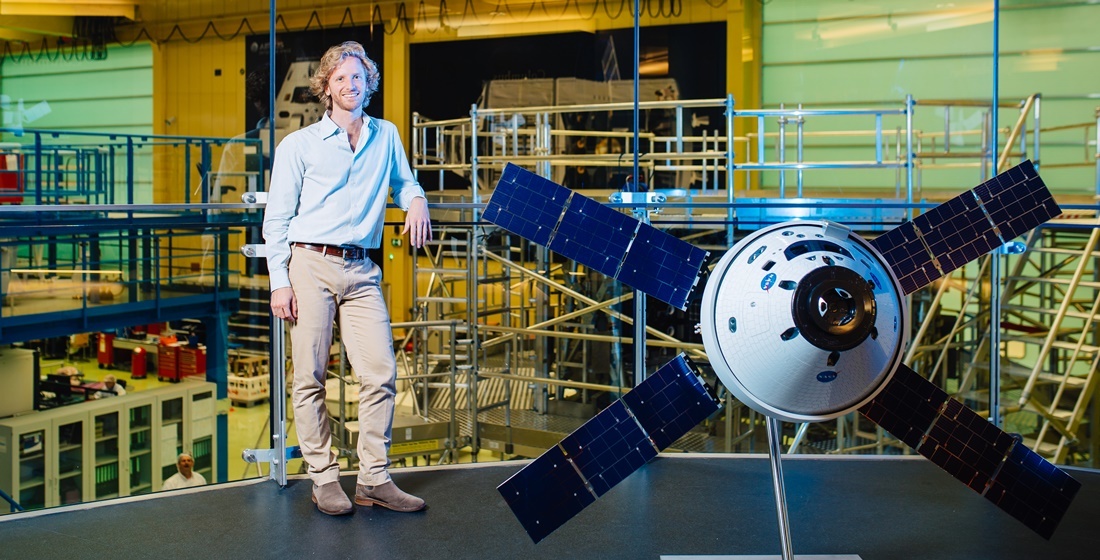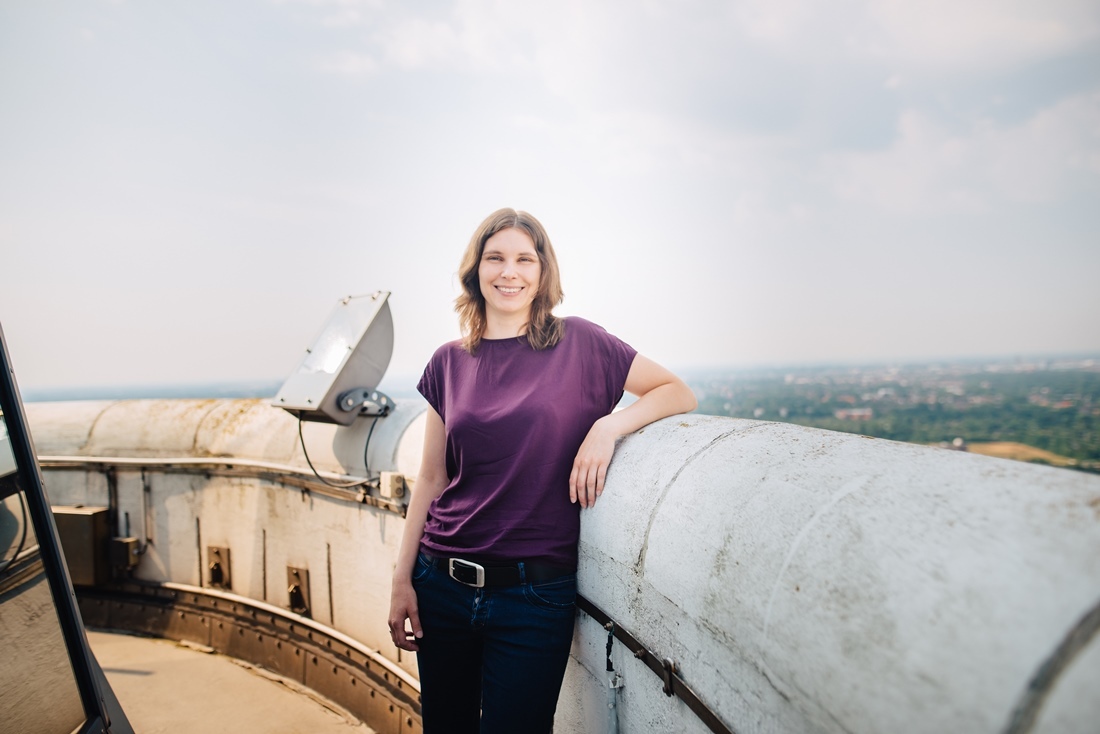The space industry in Bremen: living and working in the Hanseatic city
AerospaceScientists give their view on Bremen as a hub for the space sector

Nowhere in Germany is bigger in the aerospace industry than Bremen. We spoke to Bremen-based scientists working on the space side of aerospace about their projects, their life in the city, and their tips on where to live and where to visit.
In 2018, Bremen is celebrating Space Year with a packed programme of events and activities that culminates in the International Astronautical Congress (IAC) in the autumn. We spoke to experts from the industry in the run-up to the IAC to find out what they are working on, what they love about Bremen, and what they feel the city is missing. You can read all their interviews in full on the city website Bremen.de.
Space for all
Why do we conduct research into space in the first place? Is it of any benefit to us down here on earth? Dr Marco Scharringhausen works for the Institute of Space Systems at the German Aerospace Center. One objective of his research is to better understand the earth and its processes. Finding out more about atmospheres on other planets could, for example, provide us with insights into the earth’s atmosphere and climate change. Dr Eva Hackmann from the Center of Applied Space Technology and Microgravity (ZARM) at the University of Bremen knows that it often takes decades for scientific findings to yield practical benefits. Her research into relativistic geodesy may also prove helpful in the fight against climate change. The environment is also a concern in the work of Dr Michael Buchwitz from the University of Bremen’s Institute of Environmental Physics. The physicist uses measurements obtained from satellites and aircraft to play his part in climate protection.
Dr Martin Sippel also works for the German Aerospace Center but on a different ambitious goal: "We want to make space travel more affordable for everyone." Daniel Pika from the ArianeGroup takes a similar view. Getting to a point where human beings can live on other planets is the end goal of his research. The research being done by Dr Alexander Schneider, a project manager at OHB SE, looks like it could be very useful for us consumers. Schneider wants to "dramatically reduce the price per bit per second (data volume) that is transported from the satellite to make it affordable for more people". Dr Sebastian Bartsch works on space robotics at the Robotics Innovation Center of the German Research Center for Artificial Intelligence. He believes that robots can have applications in a number of areas, from carrying out repairs to satellites and clearing orbits of space debris to making deep-see exploration more efficient.

From all over the world to Bremen
Some of the space experts were born and bred in Bremen and can’t see any reason to leave. Buchwitz jokes: "My parents didn’t give me any say in where I was born, but I’m happy with my fate nonetheless." Of course, the Hanseatic city also attracts researchers from other parts of Germany. As a student in Dresden, Paul Zabel came to Bremen to do an internship at the German Aerospace Center. He’s now employed full time there, working on technologies for cultivating plants in space. Professor Uwe Apel hails from Kassel in central Germany. After completing his PhD in Berlin, he moved to Bremen for a job and decided to stay. He’s now head of the degree programme at Bremen University of Applied Sciences and is acting head of the Institute of Aerospace Technology. Dr Valerie Schröder returned to Bremen to work at Airbus: "I was a student in Bremen, then after several years in Stuttgart working on my PhD, I was drawn back to northern Germany." Elisa Manfreda comes from even further afield. The native Italian followed her husband to Bremen when he got a job in the city. She now works at HE Space Operations as a senior international recruiter for the space industry.
Germany’s space industry capital
The scientists have a lot of positive things to say about Bremen. They speak highly about the networks and the large community of space companies, research institutes and universities. Sippel would even go so far as to say that Bremen is Germany’s space industry capital. "Where else can you get to a business meeting at the airport by bike?" adds Buchwitz. "Everything is concentrated in a really small area and that’s a big advantage in terms of efficiency, for example when new projects are being initiated."
The fact that Bremen is easy to get around is also beneficial for the experts outside of work. They love living here and love spending time in the parks, by the river Weser or at the football stadium, for example. Apel, in particular, appreciates the diversity and openness of the people.
What is Bremen missing?
In terms of work, it’s not always what Bremen is missing, but what it has too much of: and for some of the scientists that is bureaucracy and red tape. Hackmann believes that there is untapped potential at the universities: "I would like to see the subject of space travel pursued in a more structured manner at the University of Bremen. Long-term planning and expertise are hugely important in this sector and that should be more heavily reflected at research level." Bartsch would like to see the companies that are based here do more research and development in the city and not use Bremen mainly for production. He thinks this would help the city to retain more skilled workers. Sippel playfully suggests a launch site for rockets, but admits the North Sea coast might be a more realistic option.
On a non-work front, the interviewees also pine for a few other things: it would be good if the North Sea were closer, for example, if there were mountains nearby and perhaps more to attract young families. Pika and Manfreda agree that Bremen’s airport should offer more direct flights to major European cities. "Every time I want to travel home (to Rome), it’s difficult to find a direct flight," she explains. "I spend way too much time waiting for connecting flights."

A city where you never have to travel too far
Bremen is known for being a city that’s easy to get around. It’s one of the reasons why most of the researchers prefer to get from A to B by bike. When the weather’s bad, they simply switch to the bus or tram. Zabel also uses car sharing services. Apel and Hackmann live outside the city and travel in by car or train. Scharringhausen loves nothing more than buzzing around the city on his Vespa.
Work-life balance
Of course, it’s not all work and no play. The scientists told us where they like to go to switch off. Spending time with the family is the priority for Scharringhausen, Bartsch and Hackmann. Many of their colleagues look to Bremen’s green spaces for relaxation, whether that means gardening, walking or going on a bike ride. While some enjoy a good book and a pot of herbal tea, others prefer to get active. But don’t think they only go jogging or for a workout at the gym. Apel uses his free time to sail, for example, and even goes paragliding.
Where to live and where to visit
The interviewees who aren’t from Bremen originally now know the city very well. What parts would they recommend to the next generation of scientists looking for a place to live? The best options for people who are studying at the university or working at the technology park are Horn-Lehe and Borgfeld. Habenhausen would be better if being near the airport is important. Findorff and Schwachhausen are both central but nonetheless quiet. For nightlife, look no further than the Viertel and Neustadt districts, say the experts. Pika offers another insider tip: the Teerhof peninsula, "where it’s quiet, but you’re close to the city centre and everything that’s going on".
Scharringhausen makes the following suggestions: "Spend your evenings in the Loft bar by the train station and at the weekend head to the Wümmewiesen and Blockland countryside." Bartsch adds: "For going out, I’d recommend the Viertel with its ‘Bermuda triangle’ or the Schlachte Embankment". Hackmann echoes the tip for the Schlachte in good weather and Paddy’s Pit otherwise. There’s a broad consensus that newcomers should explore the leafy side of Bremen, for example at the Bürgerpark and Rhododendron Park and in the Blockland region. Manfreda has the recipe for a short visit: "I would recommend making a list, buying a two-day ticket for the local public transport network, packing a light rucksack and just heading off. I would round off each of these days with an evening in the sun by the river Weser, the first on the Schlachte Embankment and the second in Überseestadt."
Bremen Freimarkt – a space attraction for the fair?
When they’re asked how they would present their research in the form of a fairground attraction at Bremen’s Freimarkt fair, the scientists come up with some creative answers. Their ideas range from a ghost train through the solar system and a space flight simulator to black holes. Exhibits such as the Columbus module of the International Space Station, original models of some of the Ariane rockets and a greenhouse for growing plants in space would show the visitors to the Freimarkt how exciting space research can be. Bartsch would put revellers in an exoskeleton to help them understand how artificial intelligence in robots works. The way in which carbon dioxide levels are increased by human activity but also fluctuate due to the seasonal cycles of plants would be illustrated by Buchwitz’s giant ‘bumpy’ slide.
You can read the full-length interviews on the website Bremen.de.
Success Stories
The new Ariane 6 is due to take off for the first time in summer 2024 and will secure Europe's access to space. A central element of this, the upper stage that carries the "rocket´s brain", comes from Bremen. A look behind the hermetically sealed doors in the airport city shows how the upper stage is being built in the Hanseatic city.
Learn moreBremen is Germany’s sixth-largest industrial hub in terms of revenue. Whether the sector is aerospace, food, automotive, shipping or steel production, Bremen has always been a major player.
Learn moreA century of aircraft construction in Bremen – in the post-war years, the "Airbus" project was emblematic of the history of the aviation industry in Bremen. It has been one of the Hanseatic city's most significant industrial sectors ever since.
See chronology